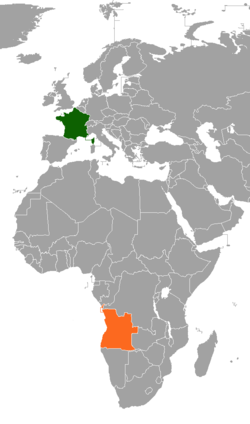
Angola, officially the Republic of Angola, is a country located on the west coast of Southern Africa. It is the second-largest Lusophone (Portuguese-speaking) country in both total area and population, and is the seventh-largest country in Africa. It is bordered by Namibia to the south, the Democratic Republic of the Congo to the north, Zambia to the east, and the Atlantic Ocean to the west. Angola has an exclave province, the province of Cabinda, that borders the Republic of the Congo and the Democratic Republic of the Congo. The capital and most populous city is Luanda.

The current political regime in Angola is presidentialism, in which the President of the Republic is also head of state and government; it is advised by a Council of Ministers, which together with the President form the national executive power. Legislative power rests with the 220 parliamentarians elected to the National Assembly. The President of the Republic, together with the parliament, appoints the majority of the members of the two highest bodies of the judiciary, that is, the Constitutional Court and the Supreme Court. The judiciary is still made up of the Court of Auditors and the Supreme Military Court.

The National Front for the Liberation of Angola is a political party and former militant organisation that fought for Angolan independence from Portugal in the war of independence, under the leadership of Holden Roberto.
The Mitterrand–Pasqua affair, also known informally as Angolagate, was an international political scandal over the secret sale and shipment of arms from Central Europe to the government of Angola by the Government of France in the 1990s. The scandal has been tied to several prominent figures in French politics.

Angola and the United States have maintained cordial diplomatic relations since 1993. Before then, antagonism between the countries hinged on Cold War geopolitics, which led the U.S. to support anti-government rebels during the protracted Angolan Civil War.
The colonial history of Angola is usually considered to run from the appearance of the Portuguese under Diogo Cão in 1482 (Congo) or 1484 until the independence of Angola in November 1975. Settlement did not begin until Novais's establishment of São Paulo de Loanda (Luanda) in 1575, however, and the Portuguese government only formally incorporated Angola as a colony in 1655 or on May 12, 1886.

Since its independence from Portugal in 1975, Angola has had three constitutions. The first came into force in 1975 as an "interim" measure; the second was approved in a 1992 referendum, and the third one was instituted in 2010.

Angola and Israel established diplomatic relations in 1993. In 1995, Israel opened an embassy in Luanda and in 2000, Angola opened an embassy in Tel Aviv.
In the Angola–Cuba Declaration of 1984, signed 19 March 1984 in Havana by president José Eduardo dos Santos of Angola and Fidel Castro, premier of Cuba, the two countries agreed to the withdrawal of Cuban forces from Angola after the withdrawal of South African troops from Angola and Namibia, and after UN-Security Council resolution 435 on Namibian independence was strictly applied.

Angola and Portugal are members of the Community of Portuguese Language Countries and the United Nations.

São Tomé and Príncipe – United States relations are bilateral relations between São Tomé and Príncipe and the United States. The U.S. Ambassador based at the embassy in Libreville, Gabon was accredited to Sao Tome on a non-resident basis until 2022, when that role was designated to the U.S. Ambassador based at the embassy in Luanda, Angola. The Ambassador and Embassy staff make regular visits to the islands. The US State Department has described relations with São Tomé and Príncipe as excellent.

Chad–France relations are the diplomatic relations between the Republic of Chad and the French Republic. France controlled Chad from 1900 until the country's independence in 1960. Both nations are today members of the Francophonie and the United Nations.

The following outline is provided as an overview of and topical guide to Angola:

Portuguese Angola refers to Angola during the historic period when it was a territory under Portuguese rule in southwestern Africa. In the same context, it was known until 1951 as Portuguese West Africa.

Angola–India relations refers to the international relations that exist between Angola and India.

Angola–Mexico relations are the diplomatic relations between the Republic of Angola and the United Mexican States. Both nations are members of the United Nations. Neither country has a resident ambassador.

Equatorial Guinea and India maintain diplomatic relations.

Formal diplomatic relations between Angola and Spain were established in 1977. Angola has an embassy in Madrid. Spain has an embassy in Luanda.

Angola–Germany relations are the bilateral relations between Angola and Germany. Angola has an embassy in Berlin and Germany has an embassy in Luanda.

















